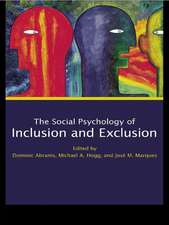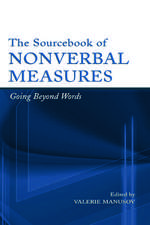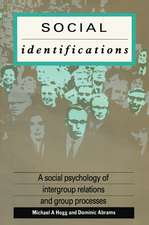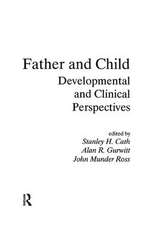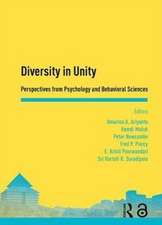Intergroup Relations: Key Readings: Key Readings in Social Psychology
Editat de Michael A. Hogg, Dominic Abramsen Limba Engleză Paperback – 12 mar 2001
Din seria Key Readings in Social Psychology
- 8%
 Preț: 395.61 lei
Preț: 395.61 lei - 8%
 Preț: 408.73 lei
Preț: 408.73 lei - 20%
 Preț: 395.34 lei
Preț: 395.34 lei - 24%
 Preț: 362.17 lei
Preț: 362.17 lei - 15%
 Preț: 507.19 lei
Preț: 507.19 lei - 15%
 Preț: 514.63 lei
Preț: 514.63 lei - 41%
 Preț: 277.14 lei
Preț: 277.14 lei - 40%
 Preț: 246.96 lei
Preț: 246.96 lei - 12%
 Preț: 328.84 lei
Preț: 328.84 lei - 15%
 Preț: 500.72 lei
Preț: 500.72 lei - 15%
 Preț: 499.25 lei
Preț: 499.25 lei - 8%
 Preț: 450.06 lei
Preț: 450.06 lei - 21%
 Preț: 361.80 lei
Preț: 361.80 lei - 23%
 Preț: 335.23 lei
Preț: 335.23 lei - 22%
 Preț: 384.90 lei
Preț: 384.90 lei - 11%
 Preț: 333.86 lei
Preț: 333.86 lei - 25%
 Preț: 828.46 lei
Preț: 828.46 lei - 25%
 Preț: 779.29 lei
Preț: 779.29 lei
Preț: 441.12 lei
Preț vechi: 518.96 lei
-15% Nou
Puncte Express: 662
Preț estimativ în valută:
84.41€ • 88.42$ • 69.96£
84.41€ • 88.42$ • 69.96£
Carte tipărită la comandă
Livrare economică 09-23 aprilie
Preluare comenzi: 021 569.72.76
Specificații
ISBN-13: 9780863776793
ISBN-10: 0863776795
Pagini: 454
Dimensiuni: 178 x 254 x 25 mm
Greutate: 0.84 kg
Ediția:New.
Editura: Taylor & Francis
Colecția Psychology Press
Seria Key Readings in Social Psychology
Locul publicării:Oxford, United Kingdom
ISBN-10: 0863776795
Pagini: 454
Dimensiuni: 178 x 254 x 25 mm
Greutate: 0.84 kg
Ediția:New.
Editura: Taylor & Francis
Colecția Psychology Press
Seria Key Readings in Social Psychology
Locul publicării:Oxford, United Kingdom
Cuprins
About the Editors. Preface. Acknowledgments. Volume Overview, M. Hogg and D.Abrams. Part 1: Personality and Individual Differences, Personality and Sociocultural Factors in Intergroup Attitudes: A Cross-national Comparison T. Pettigrew. Social Dominance Orientation: A Personality Variable Predicting Social and Political Attitudes, F. Pratto, J. Sidanius, L. M. Stallworth, and B. Malle. Part 2: Goal Relations and Interdependence, Superordinate Goals in the Reduction of Intergroup Conflicts. M. Sherif, Perceptions of Racial Group Competition: Extending Blumer's Theory of Group Position to a Multiracial Social Context, L. Bobo and V. Hutchings. Part 3: Social Identity and Self-Categorization, An Integrative Theory of Intergroup Conflicts, H. Tajfel and J. Turner, Intergroup Relations and Group Solidarity: Effects of Group Identification and Social Beliefs on Depersonalized Attraction, M. Hogg and S. Hains, Part 4: Intergroup Attitudes and Explanations, Social Stereotypes and Social Groups, H. Tajfel. Affirmative Action, Unintentional Racial Biases, and Intergroup Relations, J. Dovidio and S. Gaertner. The Ultimate Attribution Error: Extending Allport's Cognitive Analysis of Prejudice, T. Pettigrew, Part 5: Intergroup Behavior and Discrimination, Experiments in Intergroup Discimination, H. Tajfel, Intergroup Discrimination in Positive and Negative Outcome Allocations: Impact of Stimulus Valence, Relative Group Status, and Relative Group Size, S. Otten, A. Mummendey, and M. Blanz, Understanding Why the Justice of Group Procedures Matters: A Test of the Psychological Dynamics of the Group-Value Model, T. Tyler, P. DeGoey, and H. Smith. Part 6: Motives for Group Membership and Intergroup Behavior, Comments on the Motivational Status of Self-Esteem in Social Identity and Intergroup, Discrimination, D. Abrams and M. Hogg. The Social Self: On Being the Same and Different at the Same Time, M. Brewer. Negotiating Social Identity When Contexts Change: Maintaining Identification and Responding to Threat, K. Ethier and K. Deaux. Part 7: Influence in Intergroup Context, Knowing What to Think by Knowing Who You Are: Self-Categorization ad the Nature of Norm Function, Conformity, ad Group Polarization, D. Abrams, M. Wetherell, S. Cochrane, M. Hogg, and J. Turner, Studies in Social Influence: V Minority Influence and Conversion Behavior in a Perceptual Task, S. Moscovici and B. Personnaz. Part 8: Disadvantage, Relative Deprivation, and Social Protest, The St. Pauls Riot: An Explanation of the Limits of Crowd Action in Terms of a Social Identity Model, S. D. Reicher. Race and Relative Deprivation in the Urban United States, R. D. Vaneman, and T. Pettigrew. Responding to Membership in a Disadvantaged Group S. Wright, D.M. Taylor, and F. Moghaddam. Part 9: Intergroup Contact and Social Harmony, Reducing Intergroup Bias: The Benefits of Recategorization, S. Gaertner, J.Man, A. Murrell, J. Dovidio, Intergroup Contact: The Typical Member ad the Exception to the Rule, D. Wilder, Dimensions of Contact as Predictors of Intergroup Anxiety, Perceived Outgroup Variability, and Outgroup Attitude: An Integrative Model, M. Rabiul Islam and M. Hewstone, References, Appendix: How to Read a Journal Article in Social Psychology, C. H. Jordan and M. Zanna, Author Index, Subject Index.
Notă biografică
Michael A. Hogg, Dominic Abrams







